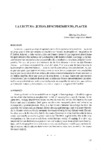| dc.contributor.author | Pérez, Miguel José | |
| dc.date.accessioned | 2011-07-13T11:29:04Z | |
| dc.date.available | 2011-07-13T11:29:04Z | |
| dc.date.issued | 2001 | |
| dc.identifier.citation | Lenguaje y textos, 2001, 17: 153-158. ISSN: 1133-4770 | es_ES |
| dc.identifier.issn | 1133-4770 | |
| dc.identifier.uri | http://hdl.handle.net/2183/8148 | |
| dc.description.abstract | [Resumen] La lectura -que en su etapa de aprendizaje no debe separarse de la escritura- ha de ser
un juego para el niño que empieza a descifrar ese "mundo de jeroglíficos", en palabras de
EUmbral. A la vez, y cada vez más, debe ser el mejor medio de que dispone el niño/el hom-
bre para descubrir los misterios de la naturaleza y del hombre mismo. Ese juego y ese des-
cubrimiento van necesariamente acompañados de, y conducen a, un placer psíquico incom-
parable. Por eso, el primer conocimiento de la obra literaria -como ya dijo Dámaso
Alonso-, y el único imprescindible, es el del lector. Y en ese placer de lector termina la
razón de ser de toda obra literaria. El autor no escribe para críticos sino para lectores. Es cier-
to, por otra parte, que también el crítico como tal es un lector y suele tener una sensibilidad
mayor; por eso la labor del buen crítico, del crítico creador/orientador ha de ser ante todo la
de indicar aquellas obras que merecen la pena leerse; y es muy importante que nuestros
niños/jóvenes lean verdaderas obras de arte: aquellas que formen sus sentimientos, que desa-
rrollen su sensibilidad más noble y su inteligencia, su capacidad de raciocinio, que cultiven
su formación humana y humanística así como el respeto a la dignidad del hombre. | es_ES |
| dc.description.abstract | [Abstract] Reading should not be separated from writing at its learning stage; it should be a game
for the child who begins to decipher that 'world of hieroglyphics', says E Umbral. At the
same time, reading should increasingly become the best way for the child/man to discover
Nature and man's misteries. Both game and discovery necessarily share and arrive to an
incomparably spiritual pleasure. Thus, it is the reader's literature knowledge the first, the
essential, the unique one, as Dámaso Alonso already said time ago. And it is inside that rea-
der's pleasure where we finally encounter the reason ofbeing for any literary work. The aut-
hor does not write for the critic, but for the reader. However, it is true that the critic is also a
reader, and usually possesses a greater sensitivity. Therefore, a good critic, who is the crea-
tive/guiding one, has to point out those works that are worthy of reading. It is also very
important for our childrenlyoungsters to read real master pieces: those which train their fee-
lings, which develop their most noble sensitivity and intelligence, which open out their abi-
lity of reason, which cultivate their human and humanistic education, as well as the respect
for man' s dignity. | es_ES |
| dc.language.iso | spa | es_ES |
| dc.publisher | Universidade da Coruña | es_ES |
| dc.title | La lectura: juego, descubrimiento, placer | es_ES |
| dc.type | info:eu-repo/semantics/article | es_ES |
| dc.rights.access | info:eu-repo/semantics/openAccess | |






